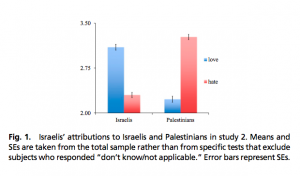Love thy neighbor: Ingroups, outgroups, and biased attributions (Study 4)
Context: Research on intergroup conflict is well supported and grounded in implementing collaboration. However, despite this data, conflict continues to grow and develop. In the present research, Waytz, Young, and Ginges (2014) provide context as to why individuals and their respective group associations may fail to respect peace-promoting findings through an analysis of “motive attribution asymmetry.” Motive attribution symmetry is an assumption-based pattern that involves ingroup vs. outgroup tendencies to respond with either biased ingroup-love or outgroup-hate assumptions.
Waytz et al. (2014) hypothesize that people will “attribute ingroup engagement in conflict to love more than hate…. but [also] attribute outgroup engagement in conflict to hate more than love” (p. 15687) Within five separate studies, Waytz et al. (2014) utilize several distinct intergroup conflicts, violent and non-violent, aiming to understand individuals’ innate sense of ingroup and outgroup motives and subsequent intergroup assumptions.
Study 2 (See Figure 1) and Study 3 outline continuing information found in study one: individuals tend to support the motive attribution asymmetry pattern and generally form internal biases that follow outgorup-hate assumptions and ingroup-love assessments.

Blue – Love
Red – Hate
Study 4: Implications of Bias
1. What They Did – Intervention Summary:
Researchers worked towards proving the prediction that the motive attribution pattern actually informs intentions to retract or maintain ones position about an outgroup or conflict member. In other words, using the information found in study 1-3, Waytz et al. wanted to see what implications may arise when individuals follow this mental pattern.
Israeli participants responded to questions regarding Palestinian motivations (ingroup love vs. out-group hate) as well as questions concerning personal beliefs in terms of retracting or maintaining attitudes about Palestinians.
2. What They Found – Results:
Again the pattern was found, however, implications of this bias were also discovered to be correlated. Specifically, Waytz et al. found that feeling that Palestinians are motivated by hate for Israelis correlated with limited desire to negotiate, limited belief in a compromise, win-win situation, as well as reduced optimism and preference for peace making deals.
3. Who Was Studied – Sample:
498 Israeli residents, contacted through and collected data by way of phone interviews; demographic information collected at the same time
4. Study Name:
Waytz et al., 2014, Study 4
5. Citation:
Waytz, A., Young, L. L., & Ginges, J. (2014). Motive attribution asymmetry for love vs. hate drives intractable conflict. Proceedings of the National Academy of Sciences, 111(44), 15687-15692. doi:10.1073/pnas.1414146111
6. Link:
http://www.pnas.org/content/111/44/15687.abstract
7. Intervention categories:
Intergroup Conflict, Ingroup love, Outgroup hate, Attribution, Cognitive bias, Religious identity, Israeli-Palestinian conflict, Gaza
8. Sample size:
498
9. Central Reported Statistic:
“This measure of bias was correlated with…
reduced willingness to negotiate [r(453) = −0.23, P < 0.0001]
reduced perceptions of a win-win [r(409) = −0.21, P < 0.0001]
reduced optimism [r(463) = −0.10, P = 0.038]
reduced personal willingness to vote for a peace deal [r(471) = −0.15, P = 0.001]
reduced expectation that Palestinians will vote for a peace deal [r(471) = −0.11, P = 0.016]
reduced positive compromise outcome beliefs [r(471) = −0.26, P < 0.0001]
increased essentialist beliefs about Palestinians [r(471) = 0.27, P < 0.0001]”
